- Home
- Arthur Miller
Collected Essays Page 14
Collected Essays Read online
Page 14
To say the least, Eliot is manifestly an apt writer of verse. The inability of this play to achieve a genuine poetic level cannot therefore be laid to the usual cause—the unpoetic nature of the playwright’s talent. Indeed, Murder in the Cathedral is a genuine poetic play, so he had already proved that he could achieve a wholeness of poetic form. I believe that the puzzlement created by The Cocktail Party, the sense of its being drawn in two opposite directions, is the result of the natural unwillingness of our minds to give to the Husband-Wife relation—a family relation—the prerogatives of the poetic mode, especially when the relationship is originally broached, as it is in this play, through any means approaching Realism.
Whether consciously or not, Eliot himself was aware of this dichotomy and wrote, and has said that he wrote, a kind of line which would not seem obtrusively formal and poetic to the listening ear. The injunction to keep it somehow unpoetic was issued by the central family situation, in my opinion. There was no need to mask his poetry at all in Murder in the Cathedral, because the situation is social, the conflict of a human being with the world. That earlier play had the unquestioned right to the poetic because it dealt with man as a public figure and could use the public man’s style and diction.
• • •
We recognize now that a play can be poetic without verse, and it is in this middle area that the complexities of tracing the influence of the family and social elements upon the form become more troublesome. Our Town by Thornton Wilder is such a play, and it is important not only for itself but because it is the progenitor of many other works.
This is a family play which deals with the traditional family figures, the father, mother, brother, sister. At the same time it uses this particular family as a prism through which is reflected the author’s basic idea, his informing principle—which can be stated as the indestructibility, the everlastingness, of the family and the community, its rhythm of life, its rootedness in the essentially safe cosmos despite troubles, wracks, and seemingly disastrous, but essentially temporary, dislocations.
Technically, it is not arbitrary in any detail. Instead of a family living room or a house, we are shown a bare stage on which actors set chairs, a table, a ladder to represent a staircase or an upper floor, and so on. A narrator is kept in the foreground as though to remind us that this is not so much “real life” as an abstraction of it—in other words, a stage. It is clearly a poetic rather than a realistic play. What makes it that? Well, let us first imagine what would make it more realistic.
Would a real set make it realistic? Not likely. A real set would only discomfit us by drawing attention to what would then appear to be a slightly unearthly quality about the characterizations. We should probably say, “People don’t really act like that.” In addition, the characterization of the whole town could not be accomplished with anything like its present vividness if the narrator were removed, as he would have to be from a realistic set, and if the entrances and exits of the environmental people, the townspeople, had to be justified with the usual motives and machinery of Realism.
The preoccupation of the entire play is quite what the title implies—the town, the society, and not primarily this particular family—and every stylistic means used is to the end that the family foreground be kept in its place, merely as a foreground for the larger context behind and around it. In my opinion, it is this larger context, the town and its enlarging, widening significance, that is the bridge to the poetic for this play. Cut out the town and you will cut out the poetry.
The play is worth examining further against the Ibsen form of Realism to which it is inevitably related if only in contrast. Unlike Ibsen, Wilder sees his characters in this play not primarily as personalities, as individuals, but as forces, and he individualizes them only enough to carry the freight, so to speak, of their roles as forces. I do not believe, for instance, that we can think of the brother in this play, or the sister or the mother, as having names other than Brother, Sister, Mother. They are not given that kind of particularity or interior life. They are characterized rather as social factors, in their roles of Brother, Sister, Mother, in Our Town. They are drawn, in other words, as forces to enliven and illuminate the author’s symbolic vision and his theme, which is that of the family as a timeless, stable quantity which has not only survived all the turmoil of time but is, in addition, beyond the possibility of genuine destruction.
The play is important to any discussion of form because it has achieved a largeness of meaning and an abstraction of style that created that meaning, while at the same time it has moved its audiences subjectively—it has made them laugh and weep as abstract plays rarely if ever do. But it would seem to contradict my contention here. If it is true that the presentation of the family on the stage inevitably forces Realism upon the play, how did this family play manage to transcend Realism to achieve its symbolistic style?
Every form, every style, pays its price for its special advantages. The price paid by Our Town is psychological characterization forfeited in the cause of the symbol. I do not believe, as I have said, that the characters are identifiable in a psychological way, but only as figures in the family and social constellation, and this is not meant in criticism, but as a statement of the limits of this form. I would go further and say that it is not necessary for every kind of play to do every kind of thing. But if we are after ultimate reality we must make ultimate demands.
I think that had Wilder drawn his characters with a deeper configuration of detail and with a more remorseless quest for private motive and self-interest, for instance, the story as it stands now would have appeared oversentimental and even sweet. I think that if the play tested its own theme more remorselessly, the world it creates of a timeless family and a rhythm of existence beyond the disturbance of social wracks would not remain unshaken. The fact is that the juvenile delinquent is quite directly traced to the breakup of family life and, indeed, to the break in that ongoing, steady rhythm of community life which the play celebrates as indestructible.
I think, further, that the close contact which the play established with its audience was the result of its coincidence with the deep longing of the audience for such stability, a stability which in daylight out on the street does not truly exist. The great plays pursue the idea of loss and deprivation of an earlier state of bliss which the characters feel compelled to return to or to recreate. I think this play forgoes the loss and suffers thereby in its quest for reality, but that the audience supplies the sense of deprivation in its own life experience as it faces what in effect is an idyl of the past. To me, therefore, the play falls short of a form that will press into reality to the limits of reality, if only because it could not plumb the psychological interior lives of its characters and still keep its present form. It is a triumph in that it does open a way toward the dramatization of the larger truths of existence while using the common materials of life. It is a truly poetic play.
• • •
Were there space, I should like to go into certain contemporary works with a view to the application in them of the forces of society and family—works by Clifford Odets, Tennessee Williams, Lillian Hellman, William Saroyan, and others. But I will jump to the final question I have in mind. If there is any truth in the idea of a natural union of the family and Realism as opposed to society and the poetic, what are the reasons for it?
First, let us remind ourselves of an obvious situation, but one which is often overlooked. The man or woman who sits down to write a play, or who enters a theater to watch one, brings with him in each case a common life experience which is not suspended merely because he has turned writer or become part of an audience. We—all of us—have a role anteceding all others: we are first sons, daughters, sisters, brothers. No play can possibly alter this given role.
The concepts of Father, Mother, and so on were received by us unawares before the time we were conscious of ourselves as selves. In contrast, the concepts of Friend, T
eacher, Employee, Boss, Colleague, Supervisor, and the many other social relations came to us long after we gained consciousness of ourselves, and are therefore outside ourselves. They are thus in an objective rather than a subjective category. In any case, what we feel is always more “real” to us than what we know, and we feel the family relation while we only know the social one. Thus the former is the very apotheosis of the real and has an inevitability and a foundation indisputably actual, while the social relation is always relatively mutable, accidental, and consequently of a profoundly arbitrary nature to us.
Today the difficulty in creating a form that will unite both elements in a full rather than partial onslaught on reality is the reflection of the deep split between the private life of man and his social life. Nor is this the first time in history that such a separation has occurred. Many critics have remarked upon it, for instance, as a probable reason for the onset of Realism in the later Greek plays, for it is like a rule of society that, as its time of troubles arrives, its citizens revert to a kind of privacy of life that excludes society, as though man at such times would like to banish society from his mind. When this happens, man excludes poetry too.
All of which, while it may provide a solution, or at least indicate the mansion where the solution lives, only serves to point to the ultimate problem more succinctly. Obviously, the playwright cannot create a society, let alone one so unified as to allow him to portray man in art as a monolithic creature. The playwright is not a reporter, but in a serious work of art he cannot set up an image of man’s condition so distant from reality as to violate the common sense of what reality is. But a serious work, to say nothing of a tragic one, cannot hope to achieve truly high excellence short of an investigation into the whole gamut of causation of which society is a manifest and crucial part. Thus it is that the common Realism of the past forty or fifty years has been assaulted—because it could not, with ease and beauty, bridge the widening gap between the private life and the social life. Thus it is that the problem was left unsolved by Expressionism, which evaded it by forgoing psychological realism altogether and leaping over to a portrayal of social forces alone. Thus it is that there is now a certain decadence about many of our plays; in the past ten years they have come more and more to dwell solely upon psychology, with little or no attempt to locate and dramatize the social roles and conflicts of their characters. For it is proper to ascribe decay to that which turns its back upon society when, as is obvious to any intelligence, the fate of mankind is social.
• • •
Finally, I should say that the current quest after the poetic as poetic is fruitless. It is the attempt to make apples without growing trees. It is seeking poetry precisely where poetry is not: in the private life viewed entirely within the bounds of the subjective, the area of sensation, or the bizarre and the erotic. From these areas of the private life have sprung the mood plays, the plotless plays for which there is much admiration as there is much relief when one turns from a problem to a ramble in the woods. I do not ask you to disdain such plays, for they are within the realm of art; I say only that the high work, the tragic work, cannot be forged waywardly, while playing by ear. There is a charm in improvisation, in letting one chord suggest the other and ending when the moment wanes. But the high order of art to which drama is fated will come only when it seeks to account for the total condition of man, and this cannot be improvised.
Whatever is said to describe a mood play, one point must be made: such plays all have in common an air of self-effacement—which is to say that they wish to seem as though they had not only no plot but no writer. They would convince us that they “just happen,” that no directing hand has arranged matters—contrary to the Ibsen plays, for instance, or, for that matter, the Shakespearean play or the Greek.
Furthermore, the entire operation is most moody when the characters involved have the least consciousness of their own existence. The mood play is a play in hiding. A true plot is an assertion of meaning. The mood play is not, as it has been mistaken for, a rebellion of any kind against the so-called well-made play, especially when Ibsen is widely held to be a writer of well-made plays. For there is as much subjectivity and inner poetry in Hedda Gabler—I daresay a lot more—as in any of these mood plays. What is really repulsive in Ibsen to one kind of contemporary mind is not openly mentioned: it is his persistent search for an organizing principle behind the “moods” of existence and not the absence of mood in his work.
An art form, like a person, can achieve greatness only as it accepts great challenges. Over the past few decades the American theater, in its best moments, has moved courageously and often beautifully into the interior life of man, an area that had most often been neglected in the past. But now, I think, we are in danger of settling for tears, as it were—for any play that “moves” us, quite as though the ultimate criterion of the art were lachrymosity. For myself, I find that there is an increasing reliance upon what pass for realistic, even tough, analytical picturizations of existence, which are really quite sentimental underneath; and the sentiment is getting thicker, I think, and an end in itself. Sentimentalism is perfectly all right, but it is nowhere near a great challenge, and to pursue it, even under the guise of the exotic atmosphere and the celebration of the sensuous, is not going to bring us closer to the fated mission of the drama.
What, after all, is that mission? I may as well end with such a question because it underlies and informs every word I have written. I think of it so: Man has created so many specialized means of unveiling the truth of the world around him and the world within him—the physical sciences, the psychological sciences, the disciplines of economic and historical research and theory. In effect, each of these attacks on the truth is partial. It is within the rightful sphere of the drama—it is, so to speak, its truly just employment and its ultimate design—to embrace the many-sidedness of man. It is as close to being a total art as the race has invented. It can tell, like science, what is—but more, it can tell what ought to be. It can depict, like painting, in designs and portraits, in the colors of the day or night; like the novel it can spread out its arms and tell the story of a life, or a city, in a few hours—but more, it is dynamic, it is always on the move as life is, and it is perceived like life through the motions, the gestures, the tones of voice, and the gait and nuance of living people. It is the singer’s art and the painter’s art and the dancer’s art, yet it may hew to fact no less tenaciously than does the economist or the physician. In a word, there lies within the dramatic form the ultimate possibility of raising the truth-consciousness of mankind to a level of such intensity as to transform those who observe it.
The problem, therefore, is not simply an aesthetic one. As people, as a society, we thirst for clues to the past and the future; least of all, perhaps, do we know about the present, about what is. It is the present that is always most evasive and slippery, for the present always threatens most directly our defenses against seeing what we are, and it is the present, always the present, to which the dramatic form must apply or it is without interest and a dead thing, and forms do die when they lose their capacity to open up the present. So it is its very nature to bring us closer to ourselves if only it can grow and change with the changing world.
In the deepest sense, I think, to sophisticated and unsophisticated alike, nothing is quite so real to us, so extant, as that which has been made real by art. Nor is this ironical and comic. For the fact is that art is a function of the civilizing act quite as much as is the building of the water supply. American civilization is only recently coming to a conscious awareness of art not as a luxury but as a necessity of life. Without the right dramatic form a genuine onslaught upon the veils that cloak the present is not possible. In the profoundest sense I cannot create that form unless, somewhere in you, there is a wish to know the present and a demand upon me that I give it to you.
For at bottom what is that form? It is the everlastingly sought balance between ord
er and the need of our souls for freedom; the relatedness between our vaguest longings, our inner questions, and private lives and the life of the generality of men which is our society and our world. How may man make for himself a home in that vastness of strangers and how may he transform that vastness into a home? This, as I have repeated, is the question a form must solve anew in every age. This, I may say, is the problem before you too.
The Shadows of the Gods
1958
I see by the papers that I am going to talk today on the subject of the literary influences on my work. It is probably a good subject, but it isn’t what Harold Clurman and I discussed when he asked if I would speak here. What he had in mind was something else. I am supposed to widen your horizons by telling something about the frame of reference I used when I started to write, and that included books I read, or music I heard, or whatnot.

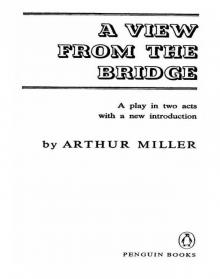 A View From the Bridge: A Play in Two Acts
A View From the Bridge: A Play in Two Acts Broken Glass
Broken Glass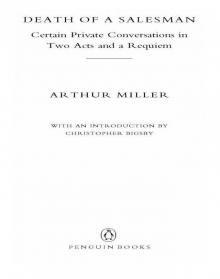 Death of a Salesman
Death of a Salesman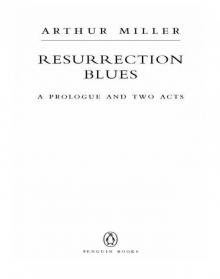 Resurrection Blues
Resurrection Blues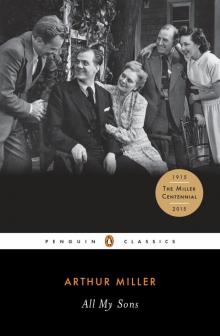 All My Sons
All My Sons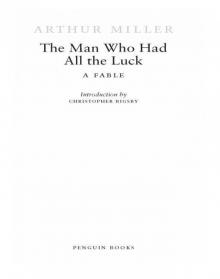 The Man Who Had All the Luck
The Man Who Had All the Luck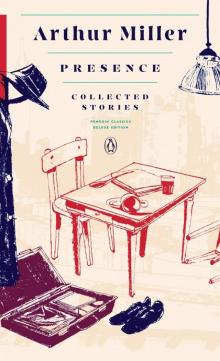 Presence: Stories
Presence: Stories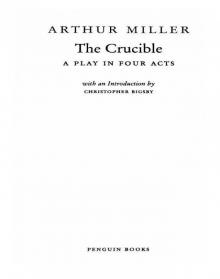 The Crucible
The Crucible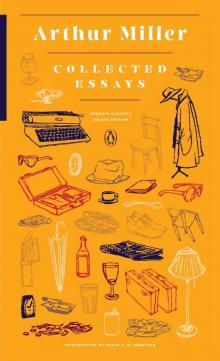 Collected Essays
Collected Essays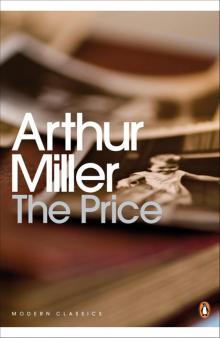 The Price
The Price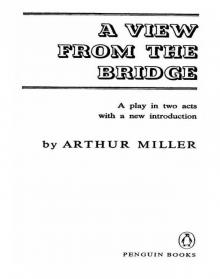 A View from the Bridge
A View from the Bridge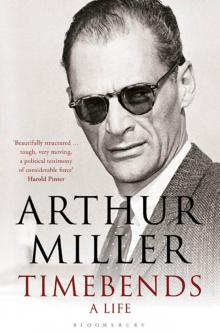 Timebends
Timebends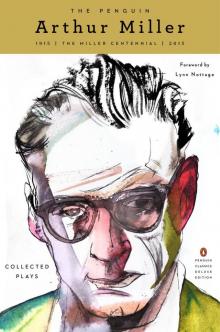 The Penguin Arthur Miller
The Penguin Arthur Miller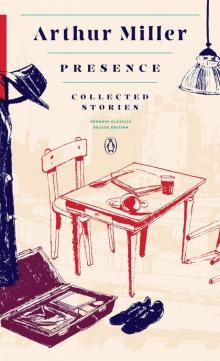 Presence
Presence